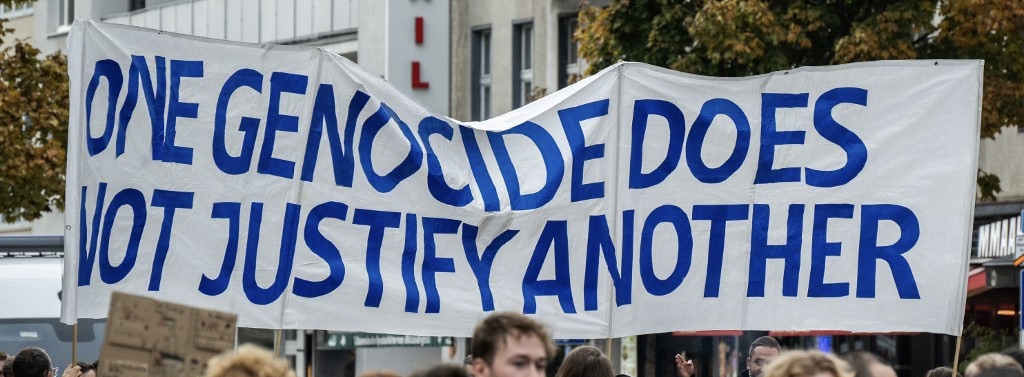Eighth Sunday after Pentecost
Ecclesiastes 1:2, 12–14; 2:18–23; Psalm 49 (sung); Luke 12:13-21
Church of Scotland, Geneva, Auditoire de Calvin, August 3 2025
“We called the report Our Genocide because that’s exactly what it is. It is genocide against humans who live here, carried out by humans who live here.”[1]
So says Yuli Novak, director of B’Tselem, the Israeli Information Centre for Human Rights in the territories occupied by Israel in 1967. B’Tselem means “in the image of” and refers to Genesis 1:27: “So God created humans in God’s image, in the image of God he created them.” The point, clearly, is that Palestinians in these territories, including Gaza, are also created in God’s image.[2] It’s a pointed argument against dehumanizing human beings, even when they get in the way of our Zionist project.
*
In December 2023, South Africa took Israel to the International Court of Justice, charging Israel with committing genocide against the people of Gaza. The court determined that the charge was “plausible” and tried both then and later to impose restraints on Israel that Israel cheerfully ignored. The mills of the International Court grind slowly. No one expects it to make a final determination much before 2027, when, for the starving and dying people of Gaza, the court’s decision won’t make much difference.
Human rights organizations haven’t waited for the court to decide. A month after the Hamas attack of October 7, Palestinian human rights organizations already warned that Israel was “deliberately inflicting on the Palestinian people conditions of life calculated to bring about its physical destruction in whole or in part”.[3] Early last year, Francesca Albanese presented the UN Human Rights Council with an anatomy of the genocide.[4] In December 2024, Amnesty International, Human Rights Watch, and Médecins Sans Frontières all declared that Israel was committing genocide in Gaza.[5] This past week, two Israeli human rights organizations joined the emerging global consensus.[6]
*
“We never thought we’d write this report,” says Yuli Novak of Our Genocide. “But we also never believed this would be our reality… Israel is acting in a coordinated, intentional manner to completely destroy the Palestinians in the Gaza Strip.”
“Israel is knowingly destroying Gaza’s health system”, says Guy Shalev of Physicians for Human Rights-Israel. “Hospital after hospital has been attacked, patients have been denied life-saving treatment, and aid has been blocked…. It is our duty as medical professionals, and to our colleagues in Gaza who are risking their lives to save others under impossible conditions, to face the truth and do everything we can to protect them.”[7]
“Nothing prepares you for the realization that you are part of a society committing genocide,” say Yuli Novak. “This is a deeply painful moment for us.”
But this is a deeply painful moment for us too. Nothing prepares us for the realization that many of us come from societies that are arming, financing, and protecting Israel as it commits genocide: the United States, Canada, and most of the western European nations. Unless we stand up and say no, we too are complicit. This is also our genocide.
*
Back in April, at a seder on the streets of New York to mark the second day of Passover, Naomi Klein, Jewish Canadian author and activist, said this:
“My friends, I’ve been thinking about Moses and his rage when he came down from the mount to find the Israelites worshiping a golden calf… [T]oo many of our people are worshipping a false idol once again. They are enraptured by it. They are drunk on it. They are profaned by it. And that false idol is called Zionism.
“It is a false idol that takes our most profound biblical stories of justice and emancipation from slavery – the story of Passover itself – and turns them into brutalist weapons of colonial land theft, roadmaps for ethnic cleansing and genocide. It is a false idol that has taken the transcendent idea of the promised land, a metaphor for human liberation that has travelled across faiths to every corner of this globe, and dared to turn it into a deed of sale for a militarist ethnostate.[8]
“Zionism has brought us to our present moment of cataclysm, and it is time that we say clearly it has always been leading us here… Zionism is a false idol that has betrayed every Jewish value…”
We should say Amen to that.
But we need to add that the western states that support Israel through thick and thin – whatever their crocodile tears – have betrayed every Christian value. For our Christian values are rooted in Judaism; and we get these values from Jews, and from one Jew in particular, Jesus of Nazareth.
“What does the Lord require of you what does the Lord require of you but to do justice and to love kindness and to walk humbly with your God?” (Micah 6:8)
This is the prophet Micah speaking to the people of Judah;[9] but what he says to them he says also to us.
What the New Revised Standard Version translates as “kindness”, other translations render as “mercy”, of which Israel has shown little, or as “compassion”, which fits well with the Gospel of Luke, the gospel of compassion par excellence. Personally, I would translate it as “solidarity”: solidarity with all who suffer and die at the hands of a wicked world.
It’s time for us to show solidarity.
*
Tom Wright tells us that he once preached an eloquent sermon on today’s Gospel, only to return home and find a note from his neighbour pinned to his door.
“Jesus did not come,” Tom had argued, “to settle our property disputes.” But the note from his neighbour said that Tom’s garden shed encroached on his land and if it wasn’t moved soon he would bulldoze it. The neighbour was probably wrong, but the irony stung too strongly. Tom moved the shed.[10]
Jesus didn’t come to settle our property disputes. The parable he tells a moment later insists that to focus on what to we possess at the expense of who we are, to focus on having rather than on being, is to miss the whole point of what it means to be human.
But sometimes we do have to pay attention to property disputes. We have to attend, as scripture says, when these have to do with justice and fairness. When Zionist Israel seizes the land and the property of the people of Palestine, we cannot give Israel a free pass.
*
“Genocide” and “grace” aren’t words we often find together in a sermon title. And I sincerely hope I won’t ever have to pair them again.
Let me turn now to grace, without which we and our fallen world have no hope.
Joseph Martos says that ever since the Reformation in 16th-century Europe, Catholics and Protestants have disagreed about what Jesus means when he says, “This is my body …. This is my blood:’ Catholics take the words to mean that the eucharistic bread and wine are really his body and blood; Protestants take them to mean that they are symbolically his body and blood.[11]
Ever since I was old enough to think seriously about these things, I have thought that this was doubly wrong.
In the first place, it’s wrong to focus on the bread and wine. What matters in the Lord’s Supper is not the bread and wine as such, but what we do in taking bread and wine and giving thanks to God, and what the risen Christ does in our doing that.
In the second place, it’s a mistake to counterpose real and symbolic. If we say that the risen Christ is present in the sacrament symbolically but not really, then we fall into the position that the Zurich reformer Ulrich Zwingli held or was caricatured as holding. If we say that the risen Christ is present in the sacrament really but not symbolically, we fall into a position that is hard to distinguish from cannibalism.
Sacraments take natural symbols and give them deeper meaning. In both of our sacraments – baptism and eucharist – we can distinguish what we do and what the risen Christ does.
Water means cleansing; it also means death. In baptism, we pour water on an unsuspecting head to symbolize washing or, more alarmingly, we immerse someone in water to symbolize drowning. In baptism, the risen Christ makes us members of his body, the church, and part of the new humanity that begins with him. If we are in Christ, we are a new creation.
Food means life. We are made of food, and without it we die. In communion, we take bread and wine, give thanks to God, and share them. It’s a symbolic meal, and it means sharing life. In communion, the risen Christ shares with us his life: he unites us with him, he unites us with each other in this congregation and the whole Christian church, he unites us with men and women everywhere in a new humanity with Christ as its head.
*
I’m echoing here what the Very Reverend Albert Bogle, who comes from a very different theological tradition than me, suggested in our Wednesday worship last week. Don’t fixate, as 16th-century Christians did, on what happens in this sacrament to the bread and wine: you’re looking in the wrong place. Focus instead on what happens to us.
In this sacramental meal, the risen Christ changes us by feeding us with his risen life. And then he sends us out to change a fallen world.
[1] Quotes from Novak come from the video introducing the Our Genocide report
[2] https://www.btselem.org/about_btselem
[3] Al-Haq, Palestinian Human Rights Organisations urge UN Special Advisers on the Prevention of Genocide and Responsibility to Protect, that immediate and effective measures are needed as genocide is unfolding in the Gaza Strip
[4] A/HRC/55/73 “Anatomy of a genocide”. Later in the year, Albanese followed this up in a report to the UN General Assembly: A/79/384 “Genocide as colonial erasure”.
[5] Amnesty International, ‘You Feel Like You Are Subhuman’: Israel’s Genocide Against Palestinians in Gaza; Human Rights Watch, Extermination and Acts of Genocide: Israel Deliberately Depriving Palestinians in Gaza of Water; Médecins Sans Frontiéres, Gaza: Life in a Death Trap
[6] FIDH, “B’Tselem and Physicians for Human Rights Israel: Israel is committing genocide in the Gaza Strip”; B’Tselem, Our Genocide; Physicians for Human Rights-Israel, Destruction of Conditions of Life: A Health-Centered Analysis of the Gaza Genocide
[7] FIDH, art.cit.
[8] Democracy Now, “Naomi Klein: Jews Must Raise Their Voices for Palestine, Oppose the ‘False Idol of Zionism’”
[9] I’m using “Micah” here as a convenient shorthand for both the 8th-century prophet and the book that bears his name: this is a sermon, not an academic article. Those interested in the redaction history of the book may consult, for example, Julia M O’Brien ed, The Oxford Handbook of the Minor Prophets (New York: OUP, 2021)[10] NT Wright, Twelve Months of Sundays: Reflections on Bible Readings. Year C (London: SPCK, 2000), 92
[11] Joseph Martos, Doors to the Sacred. A Historical Introduction to Sacraments in the Catholic Church (Liguori, MO: Liguori/Triumph, 3e, 2001), 209

